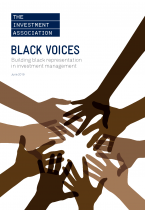07
Jun
2019

We need more black people in fund management
Financial Times - June 2019
Raheem Sterling has been lauded as much for his inspiring work off the field as on it this year.
The Manchester City and England forward has become a powerful voice highlighting and combating the racist abuse endured by black players at home and away.
There is however a more subtle kind of day-to-day discrimination that continues to hold back careers and perpetuates inequality.
Across the UK workforce, black graduates typically earn 23% less that white peers with similar degrees, according to the Equality and Human Rights Commission.
Less than 6% of African, Caribbean or black people worked as managers, directors or senior officials, according to the same research. White people were nearly twice as likely to occupy these better-paid roles.
In many workplaces there are too few black employees, especially at senior levels. And the reality is, whatever your background, if you don’t see someone who looks and sounds like you thriving in your workplace, it can be hard to think you can too.
Our industry reflects society in this way: an industry wide survey showed just 2% of some 3,755 investment management staff were from African or Caribbean backgrounds. Of the 650 investment managers featured in that research, just seven were from these communities. But we are making great efforts to change this.
We must make this change for several reasons. A less diverse industry is a weaker industry. Different voices, opinions and experiences help investment performance, widens horizons and discourages groupthink.
As custodians of £7.7 trillion invested by millions of people from the UK and beyond, and with three quarters of UK households using the services of an investment manager, we also need to look more like the people whose money we manage.
That is why the Investment Association’s latest piece of research focuses on how we can build a more inclusive workplace for black people in investment management.
Our Black Voices report is based on the views of black professionals and a survey of nearly 250 black colleagues working in our industry today, and our recommendations are shaped by their experiences.
For a start, let’s stop using BAME when we mean black: colleagues will appreciate it.
Mentoring programmes can also play a valuable role in supporting black employees’ progress, by giving them the confidence and support they need to excel and feel less isolated.
Although, 30% of black professionals surveyed felt their firm had policies in place to support the recruitment and progression of black employees, including mentoring, clearly we could be doing more.
Over half of black professionals surveyed said they had no black role models at work, whilst just over 70% felt that ethnicity employer networks were helpful in increasing representation, making the creation of black networks within firms a priority.
We also need to become more sophisticated about who and how we recruit.
Many industries too often fail to look beyond a select band of private schools and universities - institutions with few black students. This is the aim of our industry’s grassroots careers service Investment20/20, a key part of the IA, which aims to bring a more diverse range of graduates and school leavers into the industry.
To attract the brightest and most committed people to our workplaces, our nets must be cast further afield. This will mean building ties with schools, colleges and universities where our industry’s links may be weak or even non-existent.
Our recruitment processes will need to take account of candidates from inner city colleges, who might not have got the best grades, but who grafted their way through supermarket shifts while studying for their degree.
This makes the case for unconscious bias training compelling, especially for leaders, managers and other staff involved in recruitment or development. We need to make all of our people more aware of their assumptions, however subtle or unintended.
Our Black Voices report does not signal a job done or a box ticked. It is the start of a much needed conversation in Britain today. I am determined our industry takes a lead in being a catalyst for wider social change, by focusing first on the job we have to do ourselves.
Combating discrimination in football will not succeed if it becomes the preserve of a single individual such as Raheem Sterling.
Similarly, increasing the representation and progression of black people in our industry cannot simply be the duty of the HR department or head hunters. This is a challenge for all of us in investment management - and beyond.







